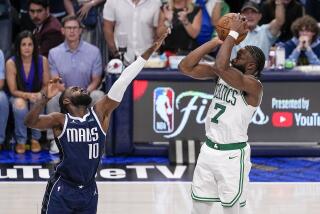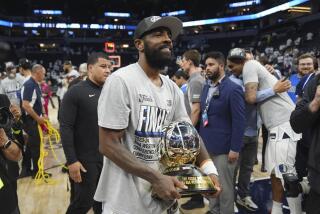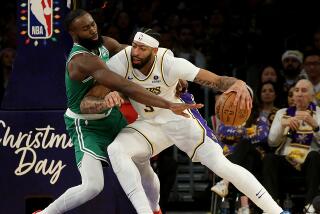It’s Been a Season of Change for Danny Ainge : Boston Celtic’s Controversial Guard Finally Has Found His Place on the Team
- Share via
BOSTON — He still is the National Basketball Assn. equivalent of a child’s dirty face. Boston Celtic guard Danny Ainge, through good times and bad, remains a player only his hometown fans could love.
And even the knowledgeable Celtic faithful were beginning to wonder if it was a case of hopeless affection.
Through two-plus seasons, they saw little more of Ainge than his choirboy appearance, myriad facial contortions and expressions and an occasional flirtation with excellence.
And those flashes were as frustrating as they were rewarding, for they only served to remind people of what was there, of what had made the Celtics fight a court battle just to get a weak-hitting Toronto Blue Jays infielder (.220 in 211 games) onto their team.
He still has yet to win the hearts of fans around the league--a fruitless effort, he recognizes. And he is probably the only Celtic whose play can bring scowls from Larry Bird, who says he sometimes has no idea what Ainge is doing.
“He’s like your little brother,” Bird says. “Sometimes he can make you so mad you just want to beat him up. But you can’t because you like him too much.”
But as he completes his third full season with the Celtics, the defending NBA champs are as solid at guard as they have been in years. And one of the pillars is Danny Ainge, like him or not.
He stepped into a pressure-cooker situation created by the Gerald Henderson trade and played well all season. He shot 53.9% from the field and averaged 12.9 points, giving the frontcourt-heavy Celtics a valuable and accurate outside deterrent to packing the middle. Only four regular starting guards in the league shot better.
And, most important, he says he is finally secure in his position and his place.
“It has been such a pleasure this year, knowing the coaching staff and management are behind you,” Ainge said. “It’s a whole different attitude. You can play through your mistakes and that’s important because if you go out there afraid to stub your toe, nothing will happen.”
His teammates had noticed a new Ainge from the day training camp started last September. For the first time in his pro basketball career, he had enjoyed an injury-free summer. He averaged 30 points in summer leagues in California and Utah.
Ainge’s transformation (some might call it a metamorphosis) couldn’t have come at a better time for him or his team. He had gone from a starter under Coach Bill Fitch to an unhappy reserve under K.C. Jones. He even lost his third- guard position to a forward (Scott Wedman) late in the season.
He began to wonder if he had made the right decision to leave baseball, or if he might be happier somewhere else in the NBA.
“When things aren’t going so well, you always think back to when you made a big decision and wonder if what you did was right, not that you’d go change again, but that if it was the right thing. It was frustrating,” he said.
It was a feeling unlike any he had ever known. And it hurt.
“Danny is such an arrogant person and he knows his ability,” Maxwell says. “For everyone to be so down on him, it destroyed him in a mental sense. He couldn’t adjust to not being a success. He was the All-American boy for so long, and he was disappointed it didn’t come so easy here as it had elsewhere for him. And it affected him.”
Until those early unpleasantries with the Celtics, success had always come easily, almost naturally, to Ainge. He was a star in every sport at every place he ever played, from the fields and playgrounds of Eugene, Ore., to the floors of the Marriott Center at Brigham Young University in Provo, Utah.
Celtic teammate Greg Kite remembers when their coach at BYU, Frank Arnold, told his players not to lift weights, watch television, eat junk food or use a whirlpool bath before a game. Ainge defiantly did all four before one game.
“He still got something like 38 points,” Kite said.
It was that sort of bravado that has made Ainge one of the more unpopular figures in the game for opposing players and fans. And that in itself is a bit of an incongruity, for he is intelligent, cooperative, likable and an indisputable talent.
“In a sense, I guess I’m like (John) McEnroe. Either you like me or you don’t. But as bad as I am, I don’t think I’m as bad as (Los Angeles Laker center) Kareem (Abdul Jabbar), (Detroit Piston guard) Isiah (Thomas) or (Laker guard) Magic (Johnson). And some of the things Larry says to the refs I could never get away with.”
While he hasn’t been able to shed his allegedly villainous image, he has worked on discarding some of his professional foibles. His summer play helped him get a head start in training camp, where he always had been trying to catch up or hold on to what he had. He shot 55% in the exhibition season, including a game-winning basket at the buzzer to beat Dallas.
It also didn’t hurt that Henderson was an unsigned free agent. Ainge’s play convinced the Celtics that they should give him another shot. There simply was too much potential talent lurking, and he was making good money ($400,000 this year and $550,000 next year).
Ainge, like many of the Celtics, was at first shocked by the Henderson trade. But he also saw it as a commitment from the Celtics. And one he feels he has met so far.
“When I first heard of the trade, my first thought was there goes a good player and great guy,” he said. “And then I thought, hey, this is my opportunity and I want to make the most of it. That’s added pressure. But it’s what I’ve been waiting for.”
More to Read
Go beyond the scoreboard
Get the latest on L.A.'s teams in the daily Sports Report newsletter.
You may occasionally receive promotional content from the Los Angeles Times.










